IOS Book Media in Our Globalizing World Released
December 09, 2014 at Constitution Club of India
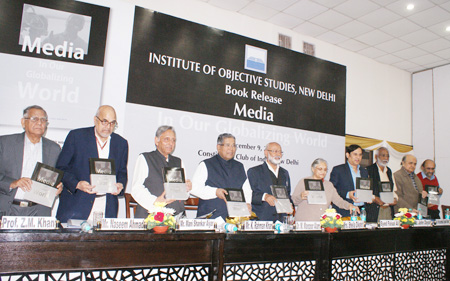
L-R: Prof. Z. M. Khan, Secretary General, IOS; Mr. Naseem Ahmad, IAS (Retd.), Chairman, National Commission for Minorities; Mr. Mani Shankar Aiyar, Former Union Minister of Petroleum & Natural Gas; Mr. K. Rahman Khan, Former Union Minister of Minority Affairs; Dr. M. Manzoor Alam, Chairman, IOS; Mrs. Sheila Dikshit, Former Chief Minister of Delhi; Mr. Syed Faisal Ali, Group Head, Rashtriya Sahara Daily & Aalami Sahara News Channel; Mr. John Dayal, Senior Journalist & Member, National Integration Council; Mr. Mohammad Zeyaul Haque, Senior Journalist; Mr. Paranjoy Guha Thakurta, Independent Journalist-Film Maker
The Institute of Objective Studies (IOS) organised a function at the Deputy Speaker Hall, Constitution Club of India Annexe, New Delhi on December 9, 2014 to mark the release of the book Media in Our Globalizing World. The book, brought out by the IOS, deals with various aspects of the media in the present context. Delivering a lecture on the theme, former Union Minister for Petroleum and Natural Gas and currently member of the Rajya Sabha, Mr. Mani Shankar Aiyar remarked, "We are in a globalising world, but the Indian media is not in the globalising world".
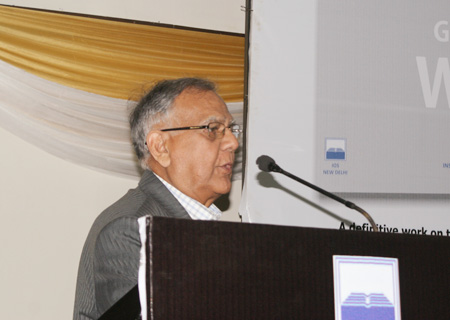
Prof. Z. M. Khan, Secretary General, IOS delivers Welcome and Introduction speech
He explained it by saying that we were unaware of what was happening around us. Citing the example of the Sri Lankan President, Mr. Mahinda Rajapaksa, who ordered election of the new President, he said that the Indian media could not report that the President was challenged by five of his ministerial colleagues. Similarly, Indian media was silent over Imran Khan running the "biggest show" in Pakistan. He observed that the Indian media failed to properly report the sate of 40 Indian labourers, the whereabouts of whom in Iraq was not known.
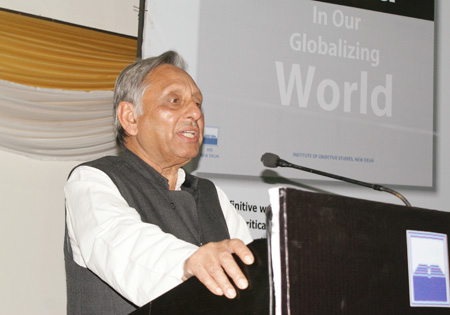
Mr. Mani Shankar Aiyar, Former Union Minister of Petroleum & Natural Gas delivers lecture on Media in Our Globalizing World
While one witness said that they had been killed by ISIS, the Ministry of External Affairs still maintained that they were alive. "We did not distinguish between the terms used for Gulf countries", he said. He explained that the West called it the Middle East, but we called it West Asia and North Africa. He pointed out that while reporting in Delhi, our media failed to report on the world outside the city. That meant that our media was not globalising.
Mr. Aiyar said that the rate of interest in the U.S. was 2 percent as against 12 percent in India. Because of this a lot of money (dollars) is parked in India. It would be taken back if the interest rate was decreased in India. He said that since advertisements contributed the main revenue of newspapers the space for news was shrinking. This put the readers in a disadvantageous position. He briefly referred to major world events that made news, but was not reported in India.
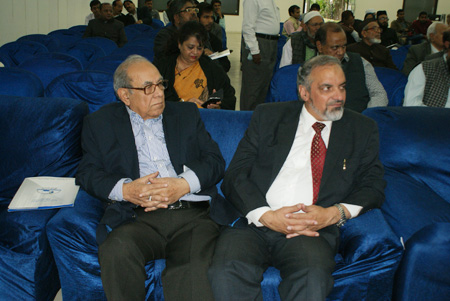
L-R: Prof. Shahid Mehdi, Former Vice Chancellor, Jamia Millia Islamia and Dr. S. Farooq, President, Tasmia Education Society, New Delhi
Eulogising India's role as a major player in international relations, he held that India stood by Egypt when the Suez Canal was nationalised. He opined that India mattered to the world because the world mattered to India. Tracing the genesis of the Second World War, he said that Hitler had become Chancellor of Germany in 1933, leading to the country's dismemberment in 1945. Britain and France were almost finished at the conclusion of the war. Describing the pitiable economic condition of Britain in the wake of the war, he said that the living standard of Britons between 1945-47 was worse than that during the war. Referring to the partition of Palestine, he observed that India was the only non-Muslim and non-Arab country to support the cause of Palestine in the wake of the war. India opposed the partition of Palestine and creation of Israel.
Mr. Aiyar was critical of the reporting of Prime Minister Narendra Modi's visit to the U.S. by the Indian media. He ridiculed the Indian media for describing the visit as a huge success adding that the U.S. media ignored it. He criticised Indian media for blacking out the news of Nepali people's protest against Modi's visit to Janakpur temple in Nepal. He said that the Nepali press had termed Modi's visit to the temple and his advice to the Nepali Constituent Assembly to draft the new Constitution soon as an interference in their country's internal affairs.
He held that barring the economic dailies and economic magazines, daily newspapers hardly touched upon economic issues. He lamented that the newspapers subsumed the interest of the middle class as this class was a major consumer of goods advertised by a minuscule section. Newspapers today ignored issues that concerned 77 percent of the population. While a sharp jump in the sensex made news thousands of times, malnutrition among children in rural and semi-urban areas missed the headlines. While calling for introspection by the media, he insisted that it was premature to say that the Indian media was globalising.
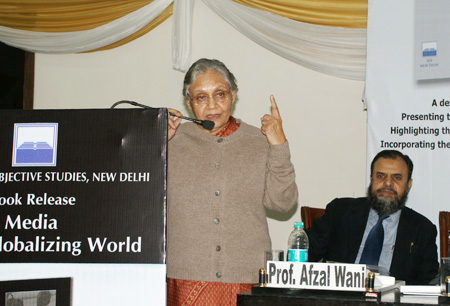
Speech by the Guest of Honour: Mrs. Sheila Dikshit, Former Chief Minister of Delhi
Former Chief Minister of Delhi, Mrs. Sheila Dikshit, who spoke as a guest of honour, said that the credibility of written and visual word was at stake. She observed that visual media's news reporting was instantaneous and in real time, the impact it created was far-reaching. She referred to the attack on World Trade Centre in New York. Emphasising the need for maintaining media's credibility, she wanted to know why the news of rape and other crimes in the country was being dished out by the media. She said that so many good things in India and the world were worth reporting but that made no news. She believed that what was important was not knowledge but the quality of knowledge.
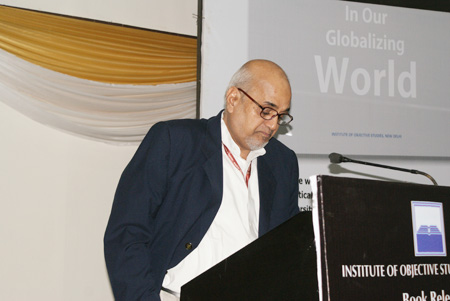
Speech by the Guest of Honour: Mr. Naseem Ahmad, IAS (Retd.), Chairman, National Commission for Minorities
The Chairman of the National Commission for Minorities, Mr. Naseem Ahmad opined that the media could not afford to be biased, particularly in a multi-religious society. He expressed the confidence that the deliberations at the function would be positively taken by media persons.
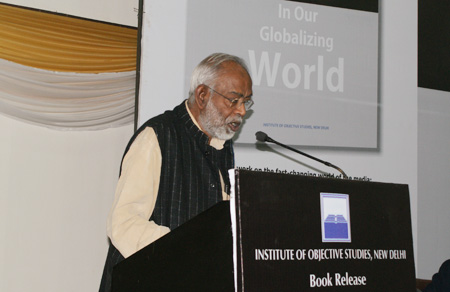
Speech by the Guest of Honour: Mr. John Dayal, Senior Journalist & Member, National Integration Council
Senior journalist and Member, National Integration Council, Mr. John Dayal pleaded that advertisements were also necessary for a newspaper to support it. He recalled the days when the national press was called "jute press" as the newspapers were owned by jute mill barons. Group Editor of the Rashtriya Sahara daily and the Alami Sahara News Channel, Syed Faisal Ali said that when he came back to India in 2011 after a gap of 22 years, the media had undergone tremendous change by that time. Indian media was plagued by multiple ailments and required transplant of vital organs to survive. He pointed out that the relationship between media, media houses and viewers had changed and it was money that ruled the roost. He was dismayed to observe that the Fourth Estate had failed. He shared his experience in the Gulf by saying that unlike in India, the Khaleej Times, Gulf News and the Arab News carried separate pages for India and Pakistan.
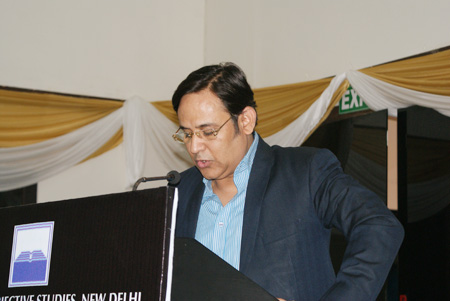
Speech by the Guest of Honour: Mr. Syed Faisal Ali, Group Head, Rashtriya Sahara Daily & Aalami Sahara News Channel
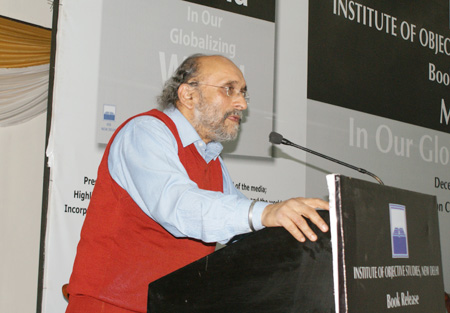
Mr. Paranjoy Guha Thakurta, Independent Journalist-Film Maker sharing his views
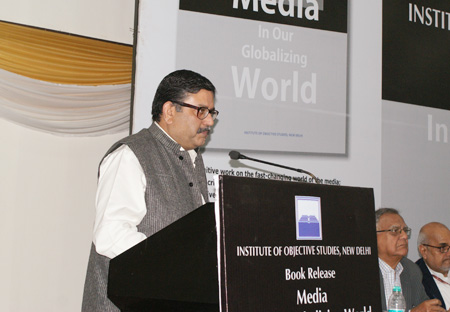
Mr. Raju Mansukhani, Senior Journalist and Consultant sharing his views
The ex-Union Minister for Minority Affairs, Mr. K. Rahman Khan, warned that the Indian media was diluting values and ethics of journalism. He said that advertisers advertised their products at the cost of readers. It was aimed at inducing consumers to buy their products. He regretted that the media was not discharging its duty to properly inform the people. The coverage of poor people in the media was scant.
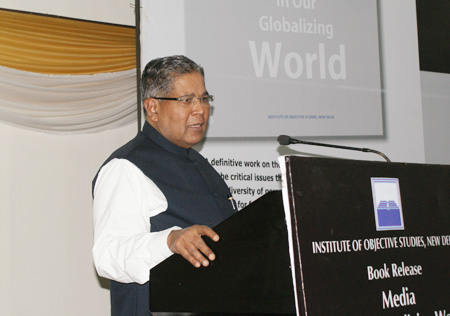
Address by the Chief Guest: Mr. K. Rahman Khan, Former Union Minister of Minority Affairs
In his presidential speech, the Chairman of the IOS, Dr. M. Manzoor Alam briefly traced the history of journalism. He said that the enslavement of humanity, regions and geography were consequences of Industrial Revolution and the French Revolution, even though they had produced some good effects. Hegemony and cultural dominance were also offshoots of these revolutions. He maintained that the 20th century saw the struggle for liberation from slavery, exploitation, aspiration for good governance with justice, equality, liberty and fraternity as the main objectives.
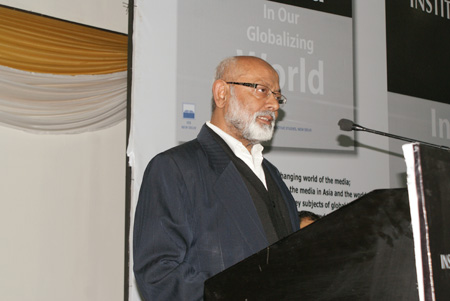
Presidential Address: Dr. M. Manzoor Alam, Chairman, IOS
He said that the 20th century also witnessed struggles for the removal of hegemony and racial and cultural domination. Media played a critical and crucial role in highlighting the struggle. He pointed out that from the last quarter of the 20th century our globalising world has been caught up in a vortex of contradictions.
There were contradictions of democracy vs. tyranny, right vs. wrong, equality vs. discrimination, humane values vs. racial supremacy, justice vs. selective justice, brotherhood vs. enslavement, fair distribution of wealth and income vs. exploitation, dignity of humanity vs. inhumanity, development vs. enslavement or exploitation of the poor and the weak. Besides, there was harmony and co-existence vs. discord and conflict, love and appreciation vs. hatred and disturbances and powerful vs. voiceless majority. He concluded by saying that from the beginning of the 21st century, media was gradually, knowingly or unknowingly, intentionally or unintentionally, supporting powerful people. Independent journalist and film-maker, Mr. Paranjoy Guha Thakurta and senior journalist and consultant, Mr. Raju Mansukhani also spoke on the occasion. These two, along with Dr. Mohammad Manzoor Alam and Mohammad Zeyaul Haque are the editors of the book.
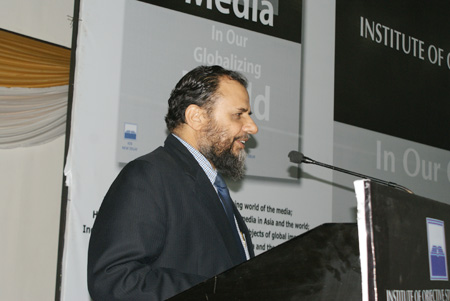
Vote of Thanks: Prof. M. Afzal Wani, Asst. Secretary General, IOS
Earlier, in his welcome address, the Secretary General of the IOS, Prof. Z.M. Khan informed that the IOS had planned to bring out 11 volumes on various subjects that were relevant to the contemporary world. The present book on media was the first of such volumes. He said that the IOS specialised in research on epistemology and Islamic thought. He maintained that the Institute collaborated with universities and other institutions of higher learning.
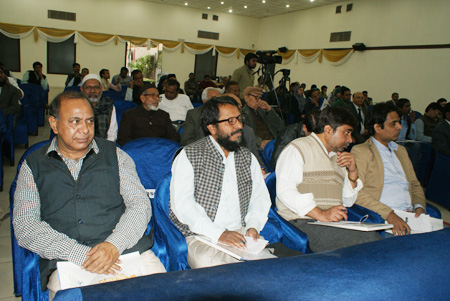
Press and Media persons attending the function
The function began with the recitation of a verse from the Holy Quran by Dr. Nakhat Husain Nadvi. The proceedings of the function were conducted by Asstt. Secretary General IOS, Prof. M. Afzal Wani. Those who attended included the Vice-Chairman of the IOS, Prof. Refaqat Ali Khan, senior journalist, Mr. Mohammad Zeyaul Haque, political and social activists, journalists, students from various institutions of journalism and prominent citizens.
Go Back